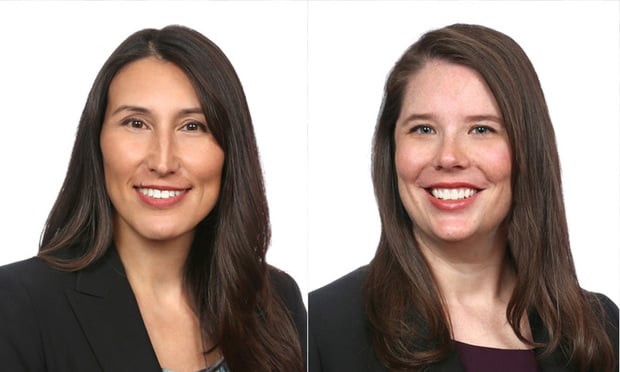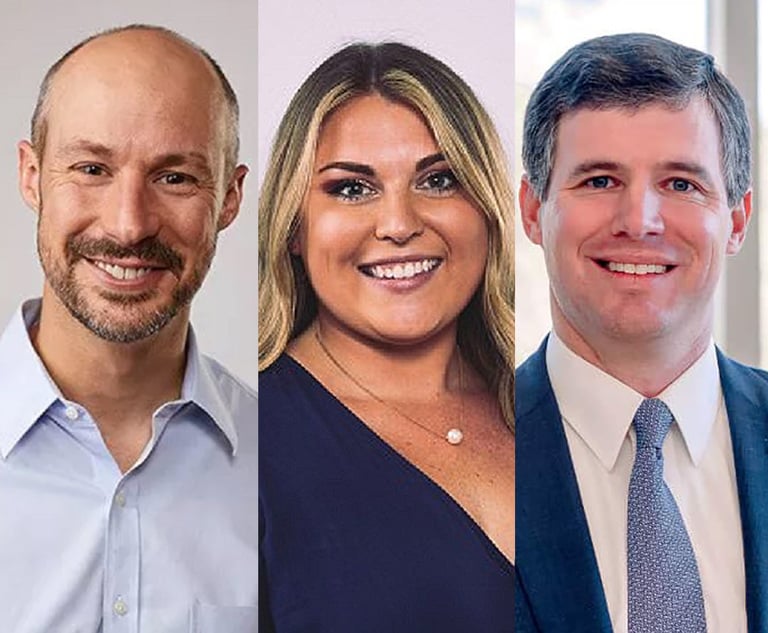The Seven Deadly Sins of Lawyers, #2: Pride
By bragging about their exploits, attorneys run the risk of either improperly disclosing client confidences or of misrepresenting facts or analyses to potential new clients.
January 18, 2019 at 01:52 PM
6 minute read
 Shari Klevens (left) and Alanna Clair, Dentons. (Courtesy photo)
Shari Klevens (left) and Alanna Clair, Dentons. (Courtesy photo)
In continuing our series about lawyers' “sins” that can lead to claims, this article focuses on pride. Attorneys are sometimes viewed by the public as bombastic or willing to say anything to win a case. Attorneys also are known to regale fellow members of the bar with their “war stories” about the biggest case they won, the most difficult client they ever had or the best exchange they ever had with a judge.
Regardless of whether such stereotypes are true, the fact remains that attorneys may feel a tension between their obligations to maintain confidentiality and civility with their desire to boast or promote their practice. Indeed, in order to win new clients, attorneys sometimes have to describe their experience to show that they are well-qualified. However, by bragging about their exploits, attorneys run the risk of either improperly disclosing client confidences or of misrepresenting facts or analyses to potential new clients, as discussed below.
The Ethics of Marketing
It is pretty common for attorneys to engage in marketing, whether in advertisements or even as part of their firm's bio website. Self-promotion, while inherently a part of marketing in the practice of law, can lead to complications in attorney-client relations.
For one, many attorneys use their bios to discuss their eminence in the field or their experience in a particular type of law. Depending on the wording, this can pose some risk. Model Rule of Professional Conduct 7.2(c) provides that “[a] lawyer shall not state or imply that a lawyer is certified as a specialist in a particular field of law, unless: (1) the lawyer has been certified as a specialist by an organization that has been approved by an appropriate authority of the state or the District of Columbia or a U.S. Territory or that has been accredited by the American Bar Association; and (2) the name of the certifying organization is clearly identified in the communication.” Thus, an attorney can be in violation of the rules of ethical conduct if they use their bio to declare themselves a certified expert, absent these credentials.
In addition, the web bio can create risks relating to confidentiality. Generally speaking, it can be risky for an attorney to speak about a case or representation—whether to the press or on the web bio—absent client permission. Most attorneys in this situation will work with the client to determine what materials or information can be made public, even in situations where the representation is public record.
In the absence of direct client consent, many attorneys will sanitize the content on their web bio to describe the experience without name-dropping the client. However, describing a matter anonymously is typically only effective if the public cannot easily ascertain the case from the many clues dropped by an attorney.
Speaking to the News Media
Sometimes, for some high-profile cases, reporters may ask attorneys to comment on their cases or the parties involved. In such situations, attorneys may be tempted to engage in some light trash-talking or to boast about their ability to “win” against opposing counsel. In addition to the risks of confidentiality or about appearing unusually prideful, such tactics could violate the Rules of Professional Conduct.
Rule 3.6(a) of the ABA Model Rules of Professional Conduct prohibits an attorney from making “an extrajudicial statement that the lawyer knows or reasonably should know will be disseminated by means of public communication and will have a substantial likelihood of materially prejudicing an adjudicative proceeding in the matter.”
This rule can be tricky to interpret in practice. Even the comments to the rule acknowledge that “[i]t is difficult to strike a balance between protecting the right to a fair trial and safeguarding the right of free expression.” The public may have a right to know, and a client may have a right to address public concern, but lawyers can find themselves getting in trouble for going too far. Lawyers may also have the right to “protect a client from the substantial undue prejudicial effect of recent publicity not initiated by the lawyer or the lawyer's client.” Rule 3.6(c).
The comments to the rule also identify circumstances regarding which public statements may be more likely to lead to prejudice. These include comments as to the character of a party to the litigation, a stated opinion as to a defendant's guilt or innocence, or disclosing information that is likely to be inadmissible as evidence in a trial.
Providing Risk Assessments to Clients
Clients often rely on their counsel to provide reasonable assessments of risks and liabilities, and then may use those assessments to make decisions about the case, such as what discovery to engage in or whether (and for what amount) to settle.
In reaching such opinions, attorneys typically depend on the facts, applicable law, and, sometimes, the experience of the attorney. Although attorneys are not expected to be psychic, clients may seek to hold them accountable if their assessment deviates from the standard of care. The risk is that where the actual outcome differs dramatically from the attorney's prediction, the clients (or their insurers) may try to blame the attorneys for not seeing it coming.
Sometimes, attorneys may feel the need to pad their chances of success in a case, either due to self-preservation (i.e., the desire to stay on a case that may not be proceeding as expected) or as part of a savior complex (i.e., the desire to be the saving grace in a case). In such situations, an attorney may choose to emphasize the import of their own involvement to the outcome of the case. Such a move may soothe an ego, but can come with a steep risk. Indeed, if the attorney maintains that their involvement is such a strong factor indicating success, there is a risk that the client could try to prove the converse if the case goes south and seek to hold the attorney liable.
By being aware of how pride or ego can impact the practice of law, attorneys can take steps to focus instead on the merits.
Shari L. Klevens is a partner at Dentons US in Atlanta and Washington, D.C., and serves on the firm's U.S. board of directors. She represents and advises lawyers and insurers on complex claims and is co-chair of Dentons' global insurance sector team.
Alanna Clair, also a partner at Dentons US in Washington, focuses on professional liability and insurance defense. Klevens and Clair are co-authors of “The Lawyer's Handbook: Ethics Compliance and Claim Avoidance” and the upcoming 2019 edition of “Georgia Legal Malpractice Law.”
Related Story
This content has been archived. It is available through our partners, LexisNexis® and Bloomberg Law.
To view this content, please continue to their sites.
Not a Lexis Subscriber?
Subscribe Now
Not a Bloomberg Law Subscriber?
Subscribe Now
NOT FOR REPRINT
© 2025 ALM Global, LLC, All Rights Reserved. Request academic re-use from www.copyright.com. All other uses, submit a request to [email protected]. For more information visit Asset & Logo Licensing.
You Might Like
View All

Apply Now: Superior Court Judge Sought for Mountain Judicial Circuit Bench
3 minute read
A Plan Is Brewing to Limit Big-Dollar Suits in Georgia—and Lawyers Have Mixed Feelings
10 minute read
Trending Stories
- 1Big Law Firms Sheppard Mullin, Morgan Lewis and Baker Botts Add Partners in Houston
- 2Lack of Jurisdiction Dooms Child Sex Abuse Claim Against Archdiocese of Philadelphia, says NJ Supreme Court
- 3DC Lawsuits Seek to Prevent Mass Firings and Public Naming of FBI Agents
- 4Growth of California Firms Exceeded Expectations, Survey of Managing Partners Says
- 5Blank Rome Adds Life Sciences Trio From Reed Smith
Who Got The Work
J. Brugh Lower of Gibbons has entered an appearance for industrial equipment supplier Devco Corporation in a pending trademark infringement lawsuit. The suit, accusing the defendant of selling knock-off Graco products, was filed Dec. 18 in New Jersey District Court by Rivkin Radler on behalf of Graco Inc. and Graco Minnesota. The case, assigned to U.S. District Judge Zahid N. Quraishi, is 3:24-cv-11294, Graco Inc. et al v. Devco Corporation.
Who Got The Work
Rebecca Maller-Stein and Kent A. Yalowitz of Arnold & Porter Kaye Scholer have entered their appearances for Hanaco Venture Capital and its executives, Lior Prosor and David Frankel, in a pending securities lawsuit. The action, filed on Dec. 24 in New York Southern District Court by Zell, Aron & Co. on behalf of Goldeneye Advisors, accuses the defendants of negligently and fraudulently managing the plaintiff's $1 million investment. The case, assigned to U.S. District Judge Vernon S. Broderick, is 1:24-cv-09918, Goldeneye Advisors, LLC v. Hanaco Venture Capital, Ltd. et al.
Who Got The Work
Attorneys from A&O Shearman has stepped in as defense counsel for Toronto-Dominion Bank and other defendants in a pending securities class action. The suit, filed Dec. 11 in New York Southern District Court by Bleichmar Fonti & Auld, accuses the defendants of concealing the bank's 'pervasive' deficiencies in regards to its compliance with the Bank Secrecy Act and the quality of its anti-money laundering controls. The case, assigned to U.S. District Judge Arun Subramanian, is 1:24-cv-09445, Gonzalez v. The Toronto-Dominion Bank et al.
Who Got The Work
Crown Castle International, a Pennsylvania company providing shared communications infrastructure, has turned to Luke D. Wolf of Gordon Rees Scully Mansukhani to fend off a pending breach-of-contract lawsuit. The court action, filed Nov. 25 in Michigan Eastern District Court by Hooper Hathaway PC on behalf of The Town Residences LLC, accuses Crown Castle of failing to transfer approximately $30,000 in utility payments from T-Mobile in breach of a roof-top lease and assignment agreement. The case, assigned to U.S. District Judge Susan K. Declercq, is 2:24-cv-13131, The Town Residences LLC v. T-Mobile US, Inc. et al.
Who Got The Work
Wilfred P. Coronato and Daniel M. Schwartz of McCarter & English have stepped in as defense counsel to Electrolux Home Products Inc. in a pending product liability lawsuit. The court action, filed Nov. 26 in New York Eastern District Court by Poulos Lopiccolo PC and Nagel Rice LLP on behalf of David Stern, alleges that the defendant's refrigerators’ drawers and shelving repeatedly break and fall apart within months after purchase. The case, assigned to U.S. District Judge Joan M. Azrack, is 2:24-cv-08204, Stern v. Electrolux Home Products, Inc.
Featured Firms
Law Offices of Gary Martin Hays & Associates, P.C.
(470) 294-1674
Law Offices of Mark E. Salomone
(857) 444-6468
Smith & Hassler
(713) 739-1250






